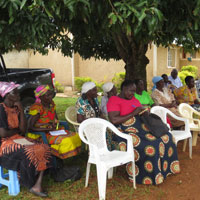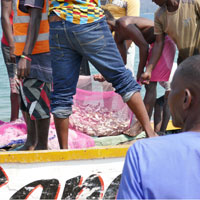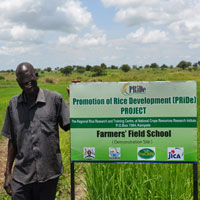Detailed Planning Surveys / Preparatory Studies / Terminal Evaluations
JICA evaluates their projects as objectively as possible, with criteria of relevance, effectiveness, efficiency, impact and sustainability, at four different stages during the project cycle; ex-ante (at planning / designing a project), mid-term (e.g. at the 3rd year of a 5-year project), terminal (6 months before the project ends), and ex-post (a few years after the project completion). The primary objective of evaluation is to improve the effectiveness and efficiency of their projects by using evaluation results for better planning and implementation. JICA also intends to secure accountability of their activities to gain public support and understanding.
We had some opportunities to participate in JICA’s evaluation activities, and below are the latest three of such activities.
Detailed Planning Survey on “Smallholder Horticulture Empowerment and Promotion Project for Local and Up-scaling 2”
|
■Sector |
: Agriculture Development |
|
■Type of technical service |
: Evaluation Analysis |
|
■Duration |
: October 2019 – December 2019 |
|
|
Through projects and activities in Kenya since 2006, JICA developed “SHEP Approach” to promote agriculture as a business (not “grow and sell” but “grow to sell”). After decentralization in Kenya in 2013, JICA conducted a technical cooperation project “Smallholder Horticulture Empowerment and Promotion Project for Local and Upscaling (SHEP PLUS)” to assist capacity building of local governments to support smallholder horticulture farmers. Following the successful implementation of SHEP PLUS, the Government of Kenya requested JICA for the implementation of “SHEP PLUS 2” to support further promotion of SHEP Approach and strengthening of small and medium-sized enterprises (SMEs) in agriculture sector for the revitalization of the whole agriculture sector in rural areas. A detailed planning survey for project formulation was conducted to discuss practical implementation methods of SHEP Approach considering policies, plans, budgetary situation and implementation systems in local governments, as well as unique but appropriate extension measures such as introduction of SHEP Approach to agricultural education institutions. Furthermore, the survey identified current status and challenges of agricultural SMEs such as processing firms and logistics companies, and discussed possibility of collaboration between agricultural SMEs and local governments in the future.
Detailed Planning Survey on the Project "A Sustainable Community Development Model Harmonized with Valuable Nature in Lake Malawi National Park, the World Natural Heritage Site" (Evaluation Analysis)
|
■Sector |
: Nature Conservation / Rural Development |
|
■Type of technical service |
: Evaluation Analysis |
|
■Duration |
: August 2019 – November 2019 |
|
|
Local people in fishery villages in Lake Malawi National Park, a World Natural Heritage site, utilize natural resources for their livelihood. A complicated social ecosystem is observed there, where natural resources and human livelihood closely interact. Excessive use of fishery resources, for example, leads not only to reduction in fishery resources, but also to overuse of forest resources to process fishery products and to deterioration of quality in tourism resources. Under such circumstances, a technical cooperation project for sustainable development was proposed to effectively and efficiently establish an integrated management system of diverse natural resources and to improve quality of life in local people, and a detailed planning survey was conducted to formulate the project. The survey confirmed that local people themselves have been doing varieties of activities to improve their livelihood, such as building man-made fishing banks in the lake to attract fishes, and developing an irrigation system with lake water to grow vegetables that are provided to local children to improve their nutritional condition. The project framework was successfully formulated, in which university researchers scientifically analyze such local initiatives to evaluate their implications in the complicated social ecosystem, and local people and the researchers respect each other and cooperate to pursue development using local natural resources sustainably.
Terminal Evaluation and Detailed Design Planning for the Promotion of Rice Development (PRiDe) Project in Uganda
|
■Sector |
: Agriculture Development |
|
■Type of technical service |
: Evaluation Analysis |
|
■Duration |
: August 2017 – November 2017 |
|
|
Demand for rice has been rapidly increasing in recent years in Uganda, and JICA has implemented the “Promotion of Rice Development (PRiDe) Project” to strengthen rice production. The project significantly contributed to rice production increase in Uganda, and the Government of Uganda requested the “Promotion of Rice Development Project Phase 2” to utilize good outputs that have been achieved and to proceed to further improve rice productivity. This survey therefore had double functions; one was terminal evaluation to analyze how far project purpose and outputs had been achieved by the end of the project phase 1, and the other was detailed design planning to formulate the phase-2 project framework by determining project implementation structure, project purpose, outputs and detailed activities.




